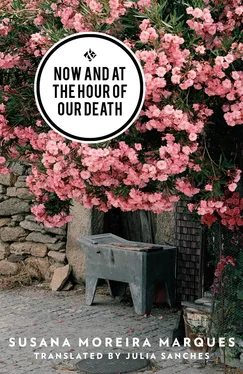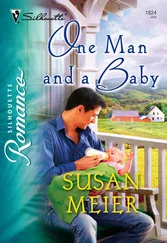They never had kids. When they got married, she was already nearing the age when women no longer have children. Being so much younger than she was, he must have known that one day he would end up taking care of her, but perhaps he had never realized how difficult it would be. He is all she has.
In these last notes, M., weak after spinal surgery, no longer plays the guitar. He now lives each day with the fear that something might happen to him and that she will then be left alone. But he doesn’t say this. He says he promised Our Lady a hundred euros — he saw Her over the door to the operating theater — and that the operation had gone well, so now everything could go back to being as normal, as alive, and as musical as ever. M. plays a recording of his own voice on an old hand-held recorder so that he does not have to speak.
*
And even if words survive, they’ll be too old to comprehend.
*
The girl walks down the steps, slowly, her legs like a ragdoll’s, with one hand held up to her chest. She leaves the house, slowly, and comes outside to sit on the bench in the sun with the old women.
*
Survival Guide:
5. Shadow the circling eagles. Imagine their nests.
*
Where is Ivan Ilyich? Where is the agony Tolstoy wrote? Where are the men who look back at the moment they became men? Where are regret and forgiveness? And the fulfillment, if there was any, felt in those joyful years? The sick suffer, and then have no strength left to think or to ask themselves those moral questions — nor do they even seem concerned (is this unique to our time?) with heaven, hell, or the Last Judgment. They just want a little more life, they want just a little more time to believe that the body can triumph; everyone wants, with disproportionate and perhaps delirious intensity, to carry on living.
*
And then love, the great survivor of all disaster.
*
If I were to go back there and knock on the door once more, and then again and again; if I had time, unhurried time, and pretended I wasn’t born in the city; if I knew how to listen more carefully, every word acknowledged and cared for; if I knew what to do with my hands and how not to take notes: would people open up and tell me what they really think about in those slow and lonely nighttime hours?
*
And finally, hands writing against hoarded images.
*
Grass as tall as children, on the roadside, dancing. In the horizon, hills meeting like lovers. All this in the deepest purple, seconds after the sun sets.
Portraits
Though wise men at their end know dark is right,
Because their words had forked no lightning they
Do not go gentle into that good night.
DYLAN THOMAS
‘Do Not Go Gentle into that Good Night’
Our almost-instinct almost true:
What will survive of us is love.
PHILIP LARKIN
‘An Arundel Tomb’
It’s August and the smell of fireworks is in the air. Somewhere, the band that will play at the dance is doing a soundcheck.
At the kitchen table, Paula takes a handful of her daughter’s hair, straightens it with a straightening iron, rests it on her daughter’s shoulder, and then picks up another. She takes her time, and these are the only gestures I see her make that aren’t impatient.
Twelve-year-old Ana has painted her nails and her eyes are made up beneath her thick brown eyebrows. The only childlike thing about her is her Hello Kitty watch. She wears a top just like her mother’s, with a wide neckline and metallic detail on the shoulder. She wears beige, her mother blue. Arm in arm, they walk down the street.
But, no, it wasn’t like that. I’m getting mixed up. It wasn’t on the night of the dance that you could smell fireworks, but the next day, when the family gathered for lunch, and there were all kinds of meat roasting over a wood fire from eight in the morning, and potatoes seasoned with savory and fresh thyme. In the closed café, the small tables had been pushed to the side and replaced with a larger one covered in a white, embroidered cloth. The family gathered inside the cool, dark café at the hottest time of day, when the light is blinding: mother, stepfather, the aunt who lived in Porto, the firefighter brother, and the emigrant brother who had traveled from Belgium. Ana was as busy as the older women, carrying trays from one side of the street to the other, from the house to the café. Luís, the youngest, barely ate. He was distracted, his eyes glued to the television and his thoughts somewhere far away, in America.
And then, looking back again, this lunch could easily be another, held two months later, on the day they harvested the grapes from Paula’s vineyard: Casimiro, her husband, grabbing beers from the freezer; the men and women who worked the harvest still drinking, as they had all morning, under the sun, which beat down mercilessly despite the calendar claiming fall had arrived. They spoke of the longevity of trees. They spoke of the long list of medicines taken by their respective husbands and wives who would not live as long as the trees. At that lunch, Paula barely ate; she’d recently been to the dentist — the culmination of a series of tooth extractions required by her chemotherapy — and the anesthetic made her nauseous. She seemed even more irritable at that lunch than at the one in August, when her husband, children, and siblings had all been around and she’d had no time for herself, and had focused every minute on being alive.
Then there was the lunch by the river, after a fishing contest, where we ate bean stew, and the money collected for food and drink was set aside for the festival thrown in August in honor of Our Lady of Good Health, the village’s patron saint. It was June, and hot for spring. Paula wore a sun hat and spoke of the river and of village life. It was only when she became annoyed with her youngest son, who kept running about too close to the water, or with her husband, because of some harmless gesture he made, that the effort in her happiness became noticeable.
That was the day Paula introduced me to her husband and children, the day she showed me the family café, open now only to friends, and the village. Peredo da Bemposta was at the end of a very long road — a good twenty minutes from the highway that connects Mogadouro to Miranda do Douro — and it was on the drive home from Peredo that I realized it is impossible to travel to the end of the world without wanting to go back there. I would want to go back over and over because time and again I would want to recover what, in my world (the center?), seemed to have been lost: a certain way of demonstrating love.
That Sunday went by quickly. Before I returned to Miranda do Douro, we stopped at Algosinho, the village next to Peredo, where Casimiro was born. We stopped there to visit a church that is a kind of stone palimpsest: the Star of David beneath the Cross of Christ.
Nearby stand the graves the villagers claim date from the time of the Moors, sculpted in the shape of the bodies underneath: two graves side by side — for a couple — and a smaller grave a few feet away, the size of a child no more than two years old. It was strange being there with that family, contemplating the graves of another family from another, distant century like they would any other monument, as if death were just a spectacle, something that happens to other people — or rather, something very ancient.
I left with the sunset in the rear-view mirror, as Paula and her family drove away in another car along another road. I think it was on that day, or perhaps the next, when, unable to stop thinking of that couple’s grave, I decided to patch things up with my partner.
Читать дальше












